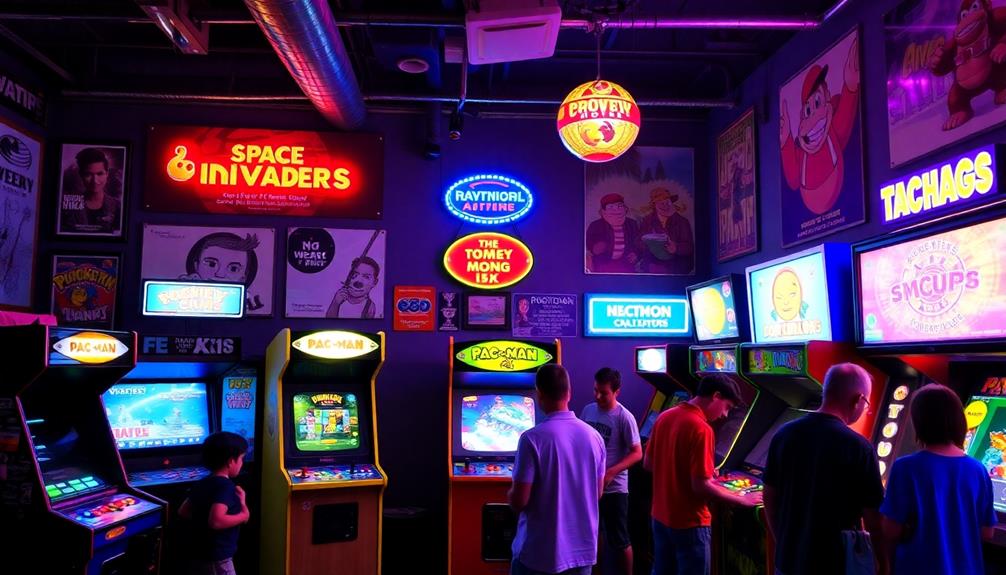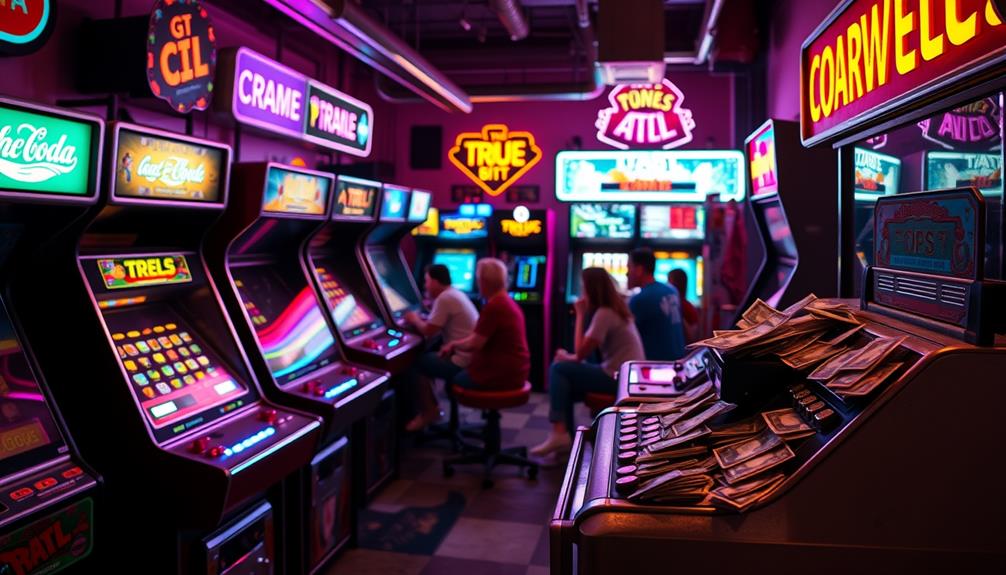To uncover the magic of **original arcade games**, you shouldn’t skip over timeless favorites like **Pac-Man**, **Space Invaders**, and **Donkey Kong**. These **legendary titles** have influenced the world of gaming, offering distinctive gameplay and unforgettable characters. **Pac-Man** with its maze-chase dynamics captivated players, while **Space Invaders** defined the fixed shooter category. **Donkey Kong** brought storytelling to games, laying the groundwork for platformers. Each game features **captivating gameplay** and **cultural significance** that still hold true today. Delving into these treasures immerses you in the golden era of gaming and provides hours of entertainment. There’s a whole lot more to learn about these classics and their enduring impact, so dive in and discover the magic for yourself!
Key Takeaways
- *Space Invaders* (1978) is a must-play for its pioneering fixed shooter mechanics that defined the genre and influenced countless games.
- *Pac-Man* (1980) offers unique maze chase gameplay with strategic elements, making it a cultural icon and a fun, non-violent experience.
- *Donkey Kong* (1981) revolutionized platform gaming by introducing engaging narratives and characters, making it essential for understanding game design evolution.
- *Defender* (1981) combines shooter and rescue mechanics, showcasing wave-based combat that influenced future action games and multiplayer experiences.
- *Street Fighter II* (1991) popularized the fighting game genre with its combo mechanics, providing a competitive multiplayer experience that remains influential today.
Historical Context of Arcade Games
The golden age of arcade video games, spanning from the late 1970s to early 1980s, marked a transformative period in gaming history. This era ignited a revolution in entertainment culture, with video game arcades becoming social hubs for gamers. It all kicked off with *Space Invaders* in 1978, which is often credited as the catalyst for the arcade boom.
As you stepped into an arcade, you'd find yourself surrounded by the beeping sounds and colorful screens of approximately 1.5 million active arcade machines by 1982. This era also saw the rise of other popular games, including pinball machines, which have their own rich history dating back to the 1930s and became integral to the arcade experience as well (History of Pinball Machines).
During this golden age, arcade machine sales skyrocketed from $50 million in 1978 to an astonishing $900 million in 1981. Iconic titles like *Pac-Man* and *Space Invaders* became cultural phenomena, capturing the imaginations of millions and grossing billions.
In fact, by 1982, the arcade industry's revenue surpassed that of pop music and Hollywood films combined, showcasing its immense impact on entertainment culture. With 24,000 video game arcades across North America, this golden age wasn't just a trend; it was a milestone in how we experience and engage with games today.
Key Titles From the Golden Age

When you think of the golden age of arcade games, iconic titles like *Pac-Man* and *Donkey Kong* probably come to mind.
These games not only introduced groundbreaking mechanics but also left a lasting cultural impact that still resonates today.
As players sought new experiences, the rise of competitive gaming and high scores mirrored the excitement found in classics like pinball machines, which showcased advanced technology and design in their own right best rated pinball machines.
Let's explore how these key titles shaped the gaming landscape and continue to influence new generations of players.
Iconic Game Mechanics
Arcade games from the golden age are packed with iconic mechanics that shaped the gaming landscape. When you think of classic arcade games, titles like Space Invaders and Galaga come to mind.
Space Invaders pioneered the fixed shooter genre, where you eliminate descending aliens before they reach the bottom of the screen. This simple yet addictive mechanic laid the groundwork for many shooter games that followed, much like how celebrity relationships evolve over time, reflecting adaptability and connection a friendly post-divorce connection.
Then there's Pac-Man, which introduced innovative maze chase mechanics. You navigate through a maze, munching on pellets while dodging colorful ghosts—this game became a cultural icon.
Donkey Kong shifted the paradigm with its engaging narrative and platform game design. You control Mario, jumping and climbing to rescue Pauline from the titular ape, which was revolutionary for storytelling in gaming.
Lastly, Defender combined shooter and rescue elements, where you pilot a spaceship to protect astronauts from alien threats. Its wave-based combat mechanics kept players on their toes, enhancing the excitement of classic arcade games.
Each of these titles showcases unique game mechanics that have influenced countless games today.
Cultural Phenomenon Impact
Classic arcade games didn't just introduce innovative mechanics; they also became cultural touchstones that influenced society at large. Titles like *Pac-Man* became a cultural phenomenon, selling over 400,000 cabinets and appealing to a diverse audience with its non-violent gameplay. This shift allowed gaming culture to flourish, as people from all walks of life gathered around the arcade machines.
The impact of these games can still be felt today, as they've inspired a new generation of best arcade machines for home game rooms that evoke nostalgia while incorporating modern technology.
*Donkey Kong* marked a significant moment in video game history by introducing Mario, setting the stage for the platformer genre and inspiring future game design. The game's popularity, alongside others, contributed to an explosive growth in the arcade industry. By 1982, video games accounted for an impressive 87% of the $8.9 billion in commercial game sales, surpassing both pop music and Hollywood films in revenue.
Even *Ms. Pac-Man* built on its predecessor's success with more complex maze layouts, further solidifying the franchise's significance in gaming culture.
These arcade games didn't just entertain; they transformed how people interacted with entertainment and each other, shaping a new era where video games became an integral part of everyday life.
Lasting Legacy Today
Nostalgia fuels the enduring popularity of iconic games from the golden age, as titles like *Pac-Man* and *Donkey Kong* continue to captivate new generations.
These original arcade games not only defined the arcade experience but also paved the way for future gaming innovations. With *Pac-Man* selling over 400,000 cabinets and *Street Fighter II* revolutionizing the fighting game genre, their lasting legacy is undeniable.
The immersive experience of engaging with these games can even evoke a sense of mindfulness, akin to music therapy integration, highlighting the emotional connection players have with classic titles.
- The thrill of chasing high scores
- The joy of mastering combo moves
- The excitement of competing with friends
Games like Space Invaders and *Galaga* remain timeless classics, showcasing innovative mechanics that keep players coming back.
The combined arcade and home video game market's revenue hit an impressive $12.8 billion in 1982, a demonstration of the enduring influence of these retro arcade games.
Their cultural significance extends beyond the arcade, inspiring merchandise, sequels, and even movies.
As you immerse yourself in the world of arcade gaming today, you'll find that these key titles still resonate.
Whether you're reliving your childhood or introducing them to a new audience, their magic continues to thrive, proving that great games never truly fade away.
Impact on Gaming Culture

Transforming the landscape of entertainment, original arcade games sparked a cultural phenomenon that resonated far beyond their pixelated screens. The arcade gaming boom of the late 1970s to early 1980s brought iconic titles like *Pac-Man* and *Donkey Kong* into the spotlight, creating a gaming culture that captivated millions.
You may remember the excitement of "Pac-Mania" and how *Space Invaders* led to a national shortage of coins in Japan—these moments became part of popular culture. The financial success of the arcade industry wasn't only driven by player engagement but also highlighted the importance of effective budgeting for operators and gamers alike as they navigated spending in this new entertainment domain, emphasizing the value of a well-planned budget.
By 1982, the U.S. arcade industry generated a staggering $8 billion, surpassing music and film revenues. This financial success signaled the cultural importance of arcade games, which not only entertained but also forged a new generation of gamers and competitive events.
The rise of video gaming also spurred the growth of gaming journalism and strategy guides, enhancing gaming experiences for enthusiasts enthusiastic to share knowledge.
The influence of arcade games extended into media, as films like *Tron* and shows like *The Goldbergs* highlighted their impact, solidifying their role in shaping gaming culture.
Today, you can still feel the echoes of this vibrant era in modern gaming experiences, reminding you of the lasting legacy of original arcade games.
Gameplay Innovations and Mechanics
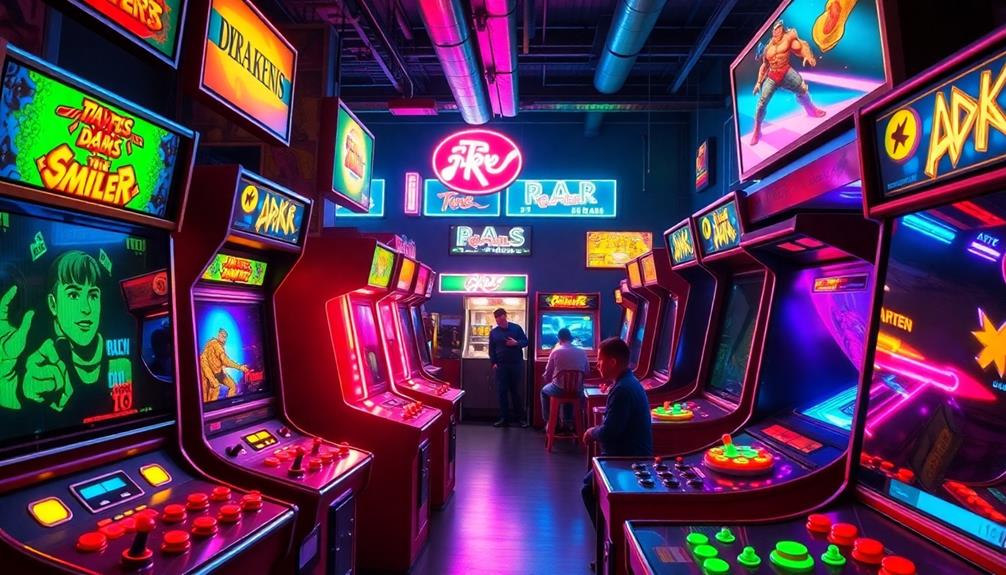
When you think about original arcade games, you'll notice how gameplay mechanics have evolved dramatically. Innovations like multiple lives in *Space Invaders* and power pellets in *Pac-Man* not only changed how you play but also shaped the overall design of future games.
These unique features made gameplay more engaging and strategic, pushing developers to explore new ideas. Additionally, the rise of coffee culture, which emphasizes community and unique experiences, can be likened to how arcade games created social environments for players to gather and compete over their favorite titles.
This highlights the importance of understanding the mechanics behind both gaming and different brewing methods to enhance the overall experience.
Gameplay Mechanics Evolution
In the domain of arcade gaming, the evolution of gameplay mechanics has markedly shaped how players interact with their favorite titles. From the early days of old arcade games like *Space Invaders*, where multiple lives encouraged you to hone your skills, to the maze-chase thrills of *Pac-Man*, gameplay has continually pushed boundaries.
With advancements in technology, such as the AI-Powered Virtual Reality in E-Learning, the potential for immersive experiences has expanded even further. Here are some key innovations:
- The thrill of power pellets in Pac-Man made you rethink your strategies.
- *Donkey Kong* and *Qix* shifted focus to timing, turning gaming into a test of skill.
- Complex mechanics in Defender offered wave-based combat, setting the stage for future action games.
These gameplay mechanics evolution trends not only enhanced engagement but also laid the groundwork for skill-based games.
The blend of old and new mechanics transformed arcade titles, making them more than just mere distractions. As you navigate through these classic games, you'll find that each title offers a unique experience, inviting you to develop your skills and enjoy the immersive worlds created by technological advancements.
Embrace the challenge and relish the nostalgia of these groundbreaking games!
Innovative Game Design Features
Innovative game design features have continually reshaped the arcade landscape, pushing the boundaries of player engagement and interactivity. Original arcade games like *Space Invaders* (1978) introduced multiple lives, fundamentally changing gameplay dynamics and paving the way for future titles.
This reflects how astrology claims to influence personality traits, as game developers harnessed player psychology to enhance the gaming experience. *Pac-Man* (1980) took it further with its maze chase mechanics, allowing players to use power pellets to turn the tables on ghosts, a concept that influenced countless games afterwards.
Then there's *Donkey Kong* (1981), which set a new standard for platform games by incorporating narrative and obstacles, compelling players to navigate levels with purpose.
This innovative level design captivated audiences and laid the groundwork for future platformers. On the other hand, *Defender* (1981) brought complex gameplay mechanics into play, merging wave-based combat with a need for strategic balance between offense and defense.
Iconic Characters and Stories
Arcade games have brought to life some of the most memorable characters and stories in gaming history that continue to resonate today. You can't help but feel a rush of nostalgia thinking about the adventures of these iconic characters. From saving princesses to battling alien invaders, these games have shaped the landscape of gaming. The charisma of these characters often parallels the astrological influences on attractiveness, highlighting how certain traits captivate players.
- The thrill of guiding Pac-Man through a maze, dodging ghosts.
- The challenge of scaling platforms to rescue Pauline from Donkey Kong.
- The excitement of blasting asteroids in outer space.
In Pac-Man, you navigate a vibrant labyrinth, munching on pellets while evading colorful ghosts, making it a cultural icon of the 1980s.
Donkey Kong, which introduced Mario, set the stage for platformers as you endeavor to save Pauline from the clutches of the titular ape.
In Space Invaders, you face descending aliens, protecting your base and feeling the tension rise with each wave.
Multiplayer Experiences in Arcades

While many gamers enjoy solo experiences, nothing beats the thrill of teaming up with friends in multiplayer arcade games. Titles like Teenage Mutant Ninja Turtles (1989) let up to four players join forces, delivering cooperative gameplay that mirrors the excitement of the beloved cartoon. You can immerse yourself in the action, working together to defeat enemies and complete levels.
The Simpsons (1991) takes a humorous spin on the beat 'em up genre, allowing you to control family members like Homer and Bart. It's a fun way to tackle challenging gameplay alongside friends.
If you're looking for a larger group experience, X-Men (1992) accommodates up to six players, featuring dual screens to enhance gameplay while showcasing iconic characters with unique powers.
Don't forget Golden Axe (1989), where cooperative gameplay shines as players use their characters' magical abilities in a fantasy setting.
These multiplayer experiences foster teamwork and social interaction, turning arcade gaming into a communal activity. Whether you're battling alongside friends or strategizing together, the joy of multiplayer arcade games creates lasting memories that solo gaming simply can't match.
Evolution of Game Genres

The journey of game genres has been shaped by the creativity and technological advancements in the gaming industry. It all started with simplistic arcade games like *Pong* and *Computer Space*, which laid the foundation for what would become a rich tapestry of gaming experiences.
As you explore the evolution of game genres, you'll witness how each title contributed to the next wave of innovation.
- The thrill of your first victory in a combat game
- The joy of mastering a challenging platform game
- The excitement of multiplayer battles with friends
The introduction of fixed shooters like Space Invaders defined the shooter genre, leading to beloved classics like *Galaga*.
Platform games emerged with titles such as *Donkey Kong*, bringing character-driven narratives to life.
With the release of *Street Fighter II*, the fighting game genre exploded in popularity, showcasing combo moves and diverse characters.
The evolution didn't stop there; genres continued to diversify, introducing rhythm games like *Dance Dance Revolution* and cooperative experiences in titles like *Teenage Mutant Ninja Turtles*.
This ongoing evolution keeps arcade gaming fresh and exciting for players of all ages.
Legacy of Classic Arcade Games
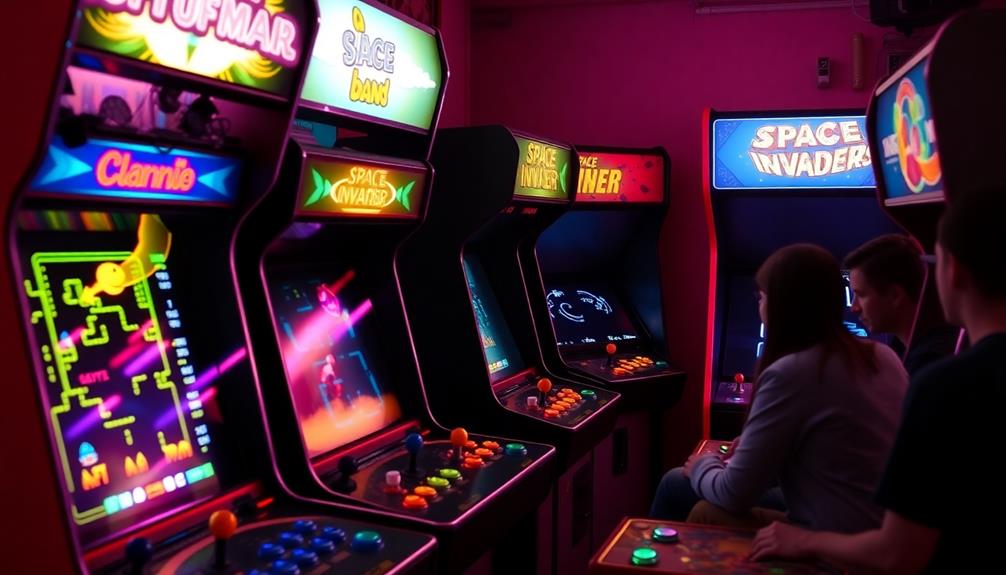
Classic arcade games have left an indelible mark on gaming culture, influencing countless titles and genres that followed. Games like *Pong* and *Space Invaders* laid the foundation for the arcade gaming industry, establishing both popularity and accessibility.
By 1982, arcade games represented a staggering 87% of the $8.9 billion commercial game sales in the U.S., showcasing their significant impact during the golden age of arcade gaming.
Iconic titles such as *Pac-Man* and *Donkey Kong* became cultural phenomena, inspiring a wave of sequels and adaptations that cemented their legacy in gaming history. The innovative gameplay mechanics introduced during this era, such as multiple lives in *Space Invaders* and maze chase dynamics in *Pac-Man*, changed how players interacted with games.
Today, the nostalgic appeal of classic arcade games continues to resonate with gamers. Venues like Wintrust Sports Complex celebrate this legacy, offering both classic and modern titles.
When you plunge into these games, you're not just playing; you're engaging with a rich history that shaped the future of gaming. Experience the thrill, and you'll understand why these classic arcade games remain timeless treasures in gaming.
Where to Find Original Games
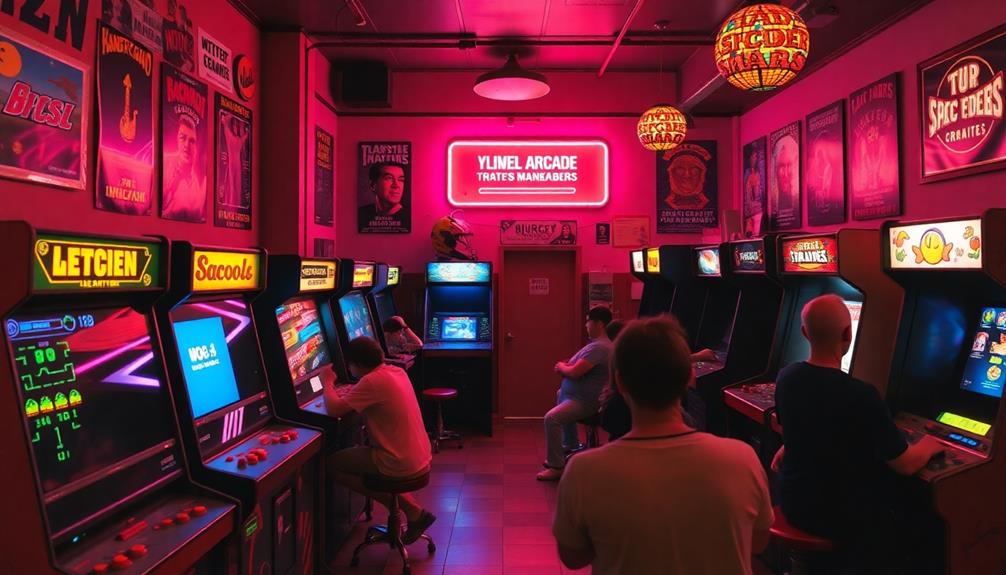
Finding original arcade games can be an exciting adventure for nostalgic gamers. If you're on the hunt for those classic experiences, there are several great places to explore.
- Feel the rush of nostalgia as you play your childhood favorites.
- Discover rare gems that take you back in time.
- Connect with fellow enthusiasts who share your passion.
Start at the Wintrust Sports Complex, where you can find a mix of original arcade games and modern twists.
Retro gaming conventions are another fantastic option, showcasing original arcade machines and iconic titles like Pac-Man and Donkey Kong. You can often find refurbished original arcade cabinets on online marketplaces like eBay or specialty game shops, perfect for collectors looking to relive the magic at home. For those looking for a more budget-friendly option, cardboard arcade games are a fun and creative way to bring the arcade experience to your own living room. There are numerous DIY kits and tutorials available online for creating your own arcade games out of cardboard, providing hours of entertainment for friends and family. Whether you prefer the authenticity of original arcade cabinets or the creativity of homemade cardboard games, there are plenty of ways to bring retro gaming into your home.
Local arcades and family entertainment centers frequently host themed nights or events, focusing on classic games to attract both new and returning players.
Don't forget to check out bars with retro arcade sections—they often feature original machines, ensuring a fun night out filled with nostalgia.
Whether you're playing or collecting, the hunt for original arcade games is sure to deliver unforgettable thrills.
Frequently Asked Questions
What Was the Original Arcade Game?
The original arcade game is *Computer Space*, released in 1971. You'll find it laid the groundwork for future arcade titles, showcasing the potential of video games and sparking interest in this emerging entertainment form.
What Was the First Popular Arcade Games?
When it comes to arcade gaming, you can't go wrong with *Pong*. It kicked off the craze in 1972, followed by hits like *Space Invaders* and *Pac-Man*, which became iconic staples of gaming culture.
What Is the Most Common Arcade Game?
You'll find that *Pac-Man* holds the title of the most common arcade game. Its vibrant maze and iconic characters captivated players since 1980, making it a lasting symbol of gaming culture and nostalgia.
Which Classic Arcade Game Do People Love Most?
When it comes to classic arcade games, you'll find *Pac-Man* captures the hearts of many. Its iconic design, addictive gameplay, and cultural significance make it the most loved game among enthusiasts and casual players alike.
Conclusion
As you step into an arcade, it's like entering a time capsule, where the sounds of retro beeps and pixelated graphics transport you back to simpler days. Just like how vinyl records are making a comeback, original arcade games remind us of gaming's roots. Whether you're chasing high scores or reliving childhood memories, these classics offer a nostalgic thrill that resonates with players of all ages. Immerse yourself, and rediscover the magic that started it all!
